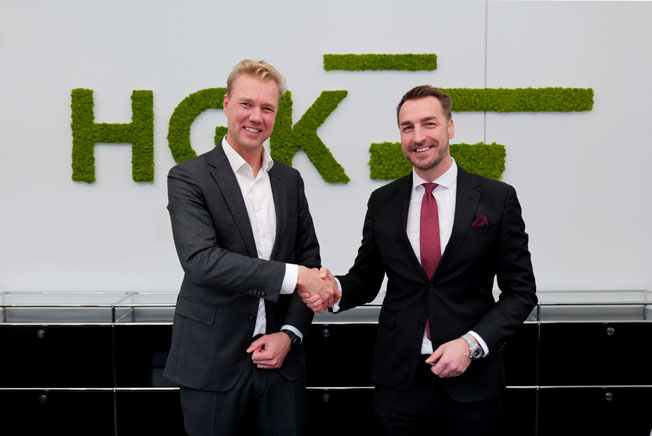
Steffen Bauer (right), CEO of the HGK-Group, and Matthijs van Doorn, Vice President of Trade at the Port of Rotterdam, signed the agreement
- Memorandum of Understanding signed
- Focus on the Rhine as a cross-border logistics route for the decarbonization of industry
- Joint advancement of hydrogen, CCUS, and renewable energy sources
Two leading logistics players in the inland waterway system, Port of Rotterdam and HGK-Group, are planning a strategic collaboration on the development of climate-friendly supply chains. On November 24th, the companies signed an agreement (memorandum of understanding) on this. Both companies see themselves as having a special responsibility to develop the Rhine corridor as a sustainable transport route for the decarbonization of industry.
With its strong position in European inland waterway transport, its stake in the freight railway RheinCargo, and a dense network of Rhine ports, the HGK-Group is one of the most important transport and logistics partners for energy- and raw material-intensive industries.
During the signing, Steffen Bauer, CEO of HGK-Group, said: "With our cooperation, we want to create a resilient supply chain concept for scaling hydrogen and carbon capture, utilization, and storage (CCUS) – from efficient multimodal transport solutions to the creation of central transshipment and supply structures. Strengthening the Rhine corridor plays a key role in this, especially for the strong chemical cluster in the Cologne region."
The Port of Rotterdam is already one of the most important import hubs for Europe's energy supply and is consistently progressing its transformation into a sustainable energy hub as part of the energy transition. Matthijs von Doorn, Vice President Commercial said: “This collaboration with the HGK-Group strengthens our ambition to position Rotterdam not only as Europe’s energy hub, but also as a driving force behind the decarbonization of industry and logistic supply chains. Only by jointly investing in infrastructure for green fuels and CO₂ storage, we can create a future-proof Rhine corridor, which is essential for the energy transition in Europe.”
The agreement creates a joint cooperation platform that will meet at least quarterly to coordinate projects and launch new initiatives. The focus will be on expanding the infrastructure for the transport of green ammonia, methanol, liquid hydrogen, and other renewable energy sources, as well as supporting cross-border CCUS activities, particularly in the industrial heartland of North Rhine-Westphalia.
The partnership complements existing initiatives along the Rhine corridor and sends a strong signal for the sustainable transformation of the European industrial and logistics landscape.
 KEYFACT Energy
KEYFACT Energy